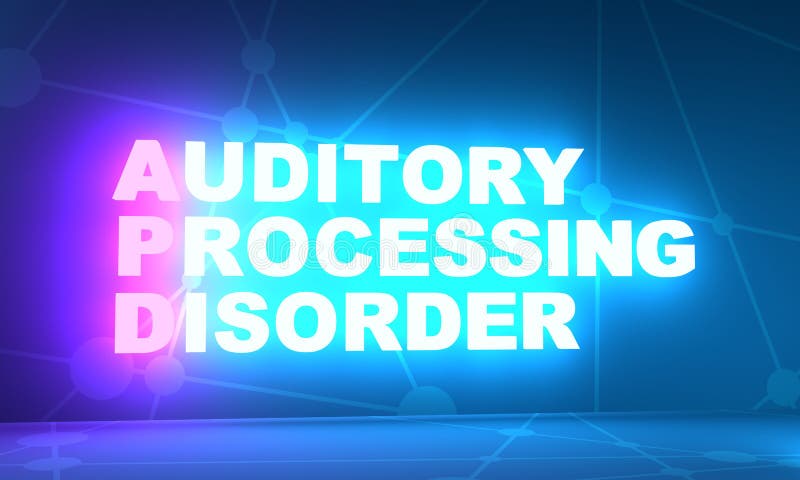

There is no cure for APD, but treatment plans and accommodations can help children (and adults) overcome APD and navigate the world.īefore APD can be treated, it’s important that a hearing test and examination is administered. If ignored, APD can cause them to fall behind academically, feel self-conscious, and have problems making friends. The sooner the disorder is diagnosed, the faster they can receive the support that will help them succeed in school.

In children with hereditary likelihood of APD, or a medical history that includes frequent ear infections or meningitis, getting tested for APD sooner rather than later is recommended. Many times, this condition develops without warning, and the cause can be difficult to determine. There are no specific actions you can take to prevent APD from developing in you or your loved ones. Because APD is often caused by uncontrollable factors, it is difficult to prevent.
Lead poisoning increases the likelihood of APD.īirth-related factors, like premature birth or low birth weight. Chronic ear infections and meningitis in childhood can cause APD. Traumatic head injuries may lead to the development of APD. In children born hard of hearing, APD is common after they receive hearing aids. Other types of hearing loss, like sensorineural or auditory nerve hearing loss. However, we can offer some possible links between certain conditions and APD: Like many other disorders, it can be difficult to pinpoint a direct cause and solution for APD. Unlike conductive or sensorineural hearing loss, where the cause is usually noise exposure or blockages, auditory processing disorder is neurological. There are quite a few possible causes of APD, though it can be difficult to determine case-by-case causation for every person. Once diagnosed, you can begin seeking treatment and improving your life.Ĭauses and prevention of APD hearing loss In fact, many adults with APD go undiagnosed because they brush aside their symptoms, blame themselves for being scatterbrained/unintelligent, or make subconscious efforts to overcome them.īecause of this, it’s important to seek a hearing test and examination if you think you might be suffering from any form of hearing loss, including APD. However, this does not mean adults cannot be diagnosed with APD. Auditory processing disorder is most noticeable in children since it can impact their performance in the classroom. tone)ĪPD is often misdiagnosed as ADHD or dyslexia, especially if the person is a child struggling with reading or writing. Problems grasping nuances of speech (i.e. Sensory overload (becoming overwhelmed or anxious when in noisy environments). Mishearing words or sentences (“sit over there” becomes “fit on the chair”). Difficulty remembering spoken instructions or information. 
The symptoms of APD are similar to hearing loss, but there are some symptoms that are more common in those with APD.
Exhaustion or fatigue at the end of the day. Unable to hold a conversation in crowded places (cocktail party effect). Asking people to repeat themselves often. Recognizing hearing loss usually involves noticing problems with someone’s hearing or understanding of sound. A speech-language pathologist and audiologist usually work together to diagnose APD and recognize or rule out any underlying hearing loss. It is common for the brain to struggle with understanding speech and other noises when it has grown unaccustomed to hearing it.įor this reason, a hearing test and examination is standard procedure for diagnosing APD. While not everyone suffering from auditory processing disorder has sensorineural, auditory nerve, or conductive hearing loss, many do. 
In many cases, hearing loss and auditory processing disorder go hand in hand. If no other form of hearing loss is present, the ears are fully capable of receiving sound, but the brain has problems processing and understanding it. In short, auditory processing disorder is a form of hearing loss, but not a traditional kind. What is auditory processing disorder hearing loss?
#Auditory processing disorder medical devices how to#
In this article, we’ll be discussing what sets them apart, and how to recognize the symptoms and seek treatment. Without proper testing, it can be difficult to differentiate between APD and other types of hearing loss. However, APD still manifests as hearing loss, and many of those with APD are considered hard-of-hearing. Many overlook auditory processing disorder when discussing hearing loss, since it does not affect the ears or the auditory nerve, but the brain itself. While many sites list three forms, there are actually four types of hearing loss: conductive, sensorineural, mixed, and auditory processing disorder. When discussing different types of hearing loss, there is one condition that is frequently overlooked.








 0 kommentar(er)
0 kommentar(er)
